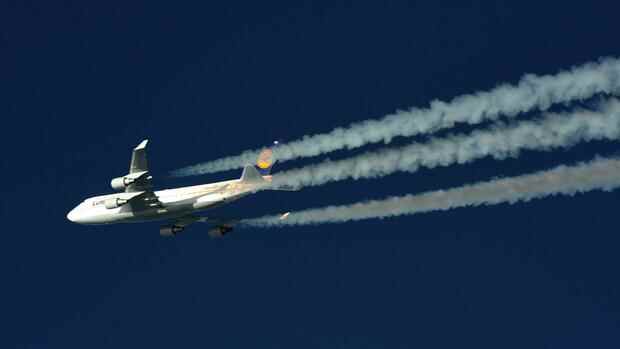The European aviation industry is at odds with certain details in the EU Commission’s plans for more climate protection when flying.
(Photo: imago images/JOKER)
Frankfurt The warning is urgent: Stefan Schulte, head of the airport operator Fraport, said on Monday that if the EU Commission’s previous proposals for new climate requirements in aviation were to remain in place, thousands of jobs would be threatened. “Up to 260,000 jobs could be lost in the European aviation industry by 2035.”
Rarely has the industry been as unanimous as when it criticized the EU climate plans entitled “Fit for 55”. Lufthansa boss Carsten Spohr, Fraport boss Schulte and Jost Lammers, the CEO of Munich Airport, appeared together in front of the cameras on Monday at the Lufthansa headquarters at Frankfurt Airport. Because it is important to get the politicians in Brussels on our side and to make changes to the climate package as far as possible.
The industry fears that competition will be distorted in favor of the airlines and airports on the Persian Gulf and the Bosporus. The arguments are well known, but now they are being presented with new vehemence. “It cannot be the political aim that such autocratic states are the beneficiaries. We are being shown just how dangerous one-sided dependencies are,” said Spohr, referring to Russian gas.
The EU Commission’s proposal has three elements. The previous emission rights trading system (ETS) is to be tightened. In the future, synthetically produced kerosene (SAF) is to be mixed in at an increasing rate. The proposal also provides for a kerosene tax.
Top jobs of the day
Find the best jobs now and
be notified by email.
The three aviation managers do not consider all three elements in their current form to be neutral in terms of competition. The ETS system should only apply within Europe, not for onward flights from hubs in the Persian Gulf or in Istanbul. The SAF quota only applies when refueling at European hubs, which non-European airlines can easily avoid. A kerosene tax, on the other hand, is only feasible globally.
The EU’s climate package makes flying more expensive
“First the customers migrate, then jobs are lost, and in the end the CO2 emissions increase because detours are flown,” said Spohr. Fraport boss Schulte calculated that European aviation could lose up to 119 million passengers.
At the same time, ticket prices would increase by 23 to 29 percent. The industry supports “Fit for 55”, emphasized Schulte: “It’s not about whether, but we need a discussion about how.”
>> Read about this: Oil price rally burdens the airlines: how expensive will flying be in the future?
As a way out, the industry representatives refer to the German ticket tax, which applies to the entire route, even if the passenger changes planes outside the EU. “The ETS needs to be rebuilt to include all feeder flights,” said Lammers, the head of Munich Airport. And the SAF quota could be made fairer, “e.g. with a levy per passenger.”
Lammers suggested that the income could flow into the production of the sustainable fuel. Or it could compensate for the competitive disadvantages that arise from the significantly more expensive SAF.
The industry hopes to be able to change the previous proposal in the political process in Brussels. “The war in Ukraine caused one thing: people are starting to think about Europe’s independence again,” said Lufthansa boss Spohr.
More: Lufthansa is fighting for a green future – these are the three main risks
